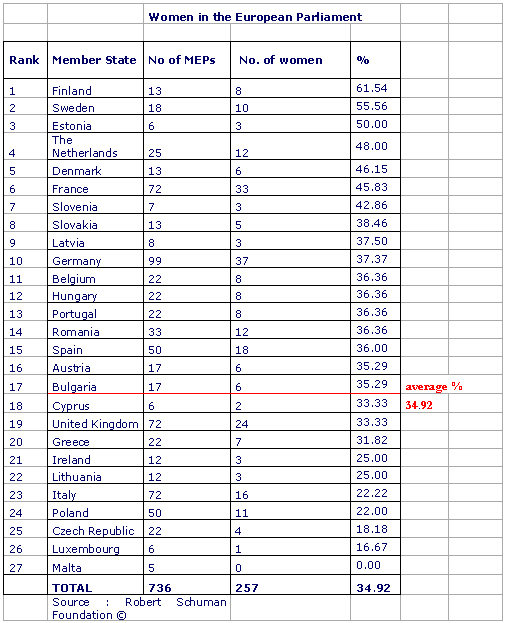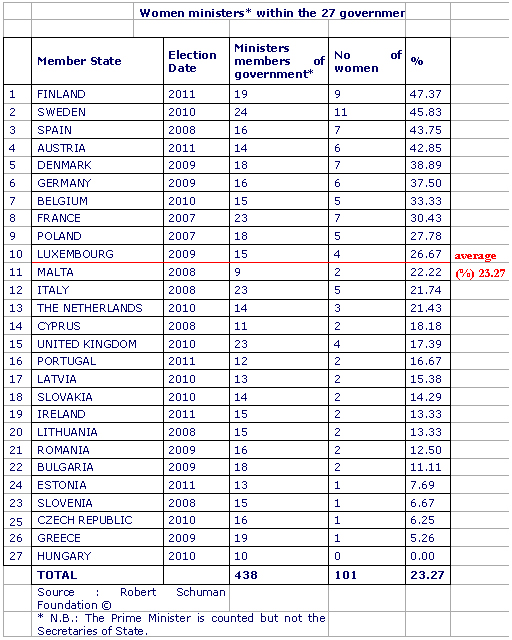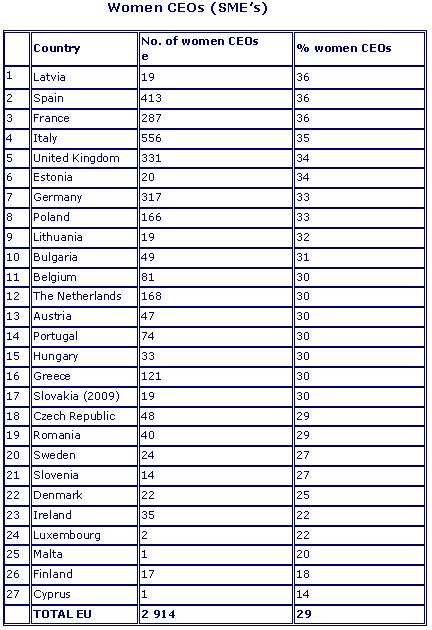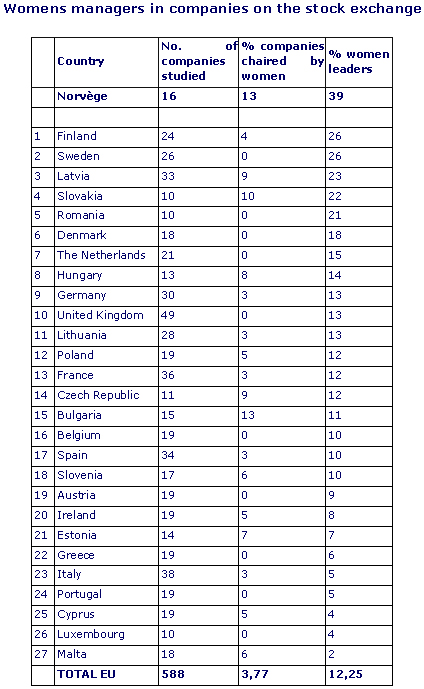Gender equality
Pascale Joannin
-

Available versions :
EN

Pascale Joannin
For many years the European Commission has been trying, and notably since 2005 and the negative referenda on the European Constitution in France and the Netherlands, to attract its citizens, to ensure that they feel closer to Europe.
But although citizens' acceptance and support for the European Union remains strong, it is indeed by a narrow majority only: although 52% of citizens consider themselves "European" [1], Europe is still widely misunderstood by most of its population. It is urgent for European leaders in the Member States and in the European institutions to remedy this.
Support is particularly low amongst women, who, we should recall, comprise the majority of the EU's population (51.04%).
The polls, notably Eurobarometer, reveal that women's approval of European policies is slightly less than that of men: between 4 to 5 points less than men on average.
Given this the Robert Schuman Foundation and the European Commission have been working together over the last five years with women as their target, in order to define what they are expecting of Europe and above all why they express themselves less and are less and why they are less enthusiastic about European integration than men.
Several conferences on the subject of relations between women and Europe have already been held since 2007:
• A silent majority: women in the EU. Raising women's awareness of Europe, a major stake for the Union's future (2007)
• Women Bridging the gap in Europe [2] (2008)
• For True Parity in Europe [3](2009)
In 2008, the conference "Women Bridging the Gap in Europe" focused on issues concerning the position of women in Europe, notably the promotion of equal opportunities, the improvement of women's position linking private and professional life via legislation, and the raising of women's awareness of the role played by the EU and strengthening links between European citizens.
The conference "For True Parity in Europe" led to the presentation of 10 suggestions for the future of women in Europe, notably the inclusion of women in the decision making process which is vital for parity; the establishment of quotas in both the private and public sectors; the modification of legislation and also mentalities; the development of solidarity between women via women's European networks.
Another conference will take place on 21st September next [4].
I– The European Union and Women
A– The Commission's Role
Every year the European Commission reviews equality between men and women in Europe in a report [5]. It notably recalls that equality between men and women is one of the founding principles of community law. The EU's goals in terms of equality comprise ensuring equal opportunities and guaranteeing that both genders are treated equally; countering gender-based discrimination. In this area it has adopted a dual approach, linking specific action and gender mainstreaming, notably with an international dimension in terms of fighting poverty, access to education and healthcare, participation in the economy and the decision making process, and women's rights as part of Human Rights.
Hence the Union has adopted 14 directives on equal treatment in the area of employment and labour, gradually obliging Member States to legislate on these issues and to bring their legislations in line. Slowly, progress has been made since 1975.
2) Council Directive 76/207/EEC of 9 February 1976 on the implementation of the principle of equal treatment for men and women as regards access to employment, vocational training and promotion, and working conditions
http://eur-lex.europa.eu/LexUriServ/LexUriServ.do?uri=CELEX:31976L0207:FR:NOT3) Council Directive 79/7/EEC of 19 December 1978 on the progressive implementation of the principle of equal treatment for men and women in matters of social security
http://www.halde.fr/IMG/alexandrie/3386.PDF4) Council Directive 86/378/EEC of 24 July 1986 on the implementation of the principle of equal treatment for men and women in occupational social security schemes
http://admi.net/eur/loi/leg_euro/fr_386L0378.html5) Council Directive 86/613/EEC of 11 December 1986 on the application of the principle of equal treatment between men and women engaged in an activity, including agriculture, in a self-employed capacity, and on the protection of self-employed women during pregnancy and motherhood
http://admi.net/eur/loi/leg_euro/fr_386L0613.html6) Council Directive 92/85/EEC of 19 October 1992 concerning the implementation of measures to encourage improvements in the safety and health of pregnant workers, workers who have recently given birth and women who are breastfeeding
http://admi.net/eur/loi/leg_euro/fr_392L0085.html7) Council Directive 96/34/EC of 3 June 1996 on the framework agreement on parental leave concluded by UNICE, CEEP and the ETUC
http://eur-lex.europa.eu/LexUriServ/LexUriServ.do?uri=CELEX:31996L0034:FR:HTML8) Council Directive 96/97/EC of 20 December 1996 amending Directive 86/378/EEC on the implementation of the principle of equal treatment for men and women in occupational social security schemes
http://eurlex.europa.eu/smartapi/cgi/sga_doc?smartapi!celexplus!prod!DocNumber&lg=fr&type_doc=Directive&an_doc=1986&nu_doc=3789) Council Directive 97/75/EC of 15 December 1997 amending and extending, to the United Kingdom of Great Britain and Northern Ireland, Directive 96/34/EC on the framework agreement on parental leave concluded by UNICE, CEEP and the ETUC
http://admi.net/eur/loi/leg_euro/fr_397L0075.html10) Council Directive 97/80/EC of 15 December 1997 on the burden of proof in cases of discrimination based on sex
http://admi.net/eur/loi/leg_euro/fr_397L0080.html11) Council Directive 98/52/EC of 13 July 1998 on the extension of Directive 97/80/EC on the burden of proof in cases of discrimination based on sex to the United Kingdom of Great Britain and Northern Ireland
http://admi.net/eur/loi/leg_euro/fr_398L0052.html12) Council Directive 76/207/EEC of 9 February 1976 on the implementation of the principle of equal treatment for men and women as regards access to employment, vocational training and promotion, and working conditions
http://eur-lex.europa.eu/LexUriServ/LexUriServ.do?uri=OJ:L:2002:269:0015:0020:FR:PDF13) Directive 2006/54/EC of the European Parliament and of the Council of 5 July 2006 on the implementation of the principle of equal opportunities and equal treatment of men and women in matters of employment and occupation (recast)
http://eur-lex.europa.eu/LexUriServ/LexUriServ.do?uri=OJ:L:2006:204:0023:0036:FR:PDF14) Council Directive 2000/78/EC of 27 November 2000 establishing a general framework for equal treatment in employment and occupation
http://europa.eu/legislation_summaries/employment_and_social_policy/employment_rights_and_work_organisation/c10823_fr.htm
The European Union has also highlighted many principles [6] and created an agency [7] devoted to gender issues. But in spite of all of these initiatives, it remains however that total equality is still a distant goal and that women have to continue working towards this.
B- A dissatisfactory overview
This is the sad truth that the EU has to face. Indeed the Commission recalls in its annual report that "inequalities continue" (...) "the disparity between the sexes remains very real and in the labour market women are still over-represented in the worst paid sectors and under-represented in positions of responsibility." [8] Moreover, according to the Commission again, "in spite of a general trend towards greater equality in society and on the labour market, progress in terms of eradicating gender inequality is still slow."
The situation is still deplorable as we see below:
• The rate of women's employment varies in the EU between 40% and 75%, with a European average of 75.8% for men and 62.5% for women, i.e. 13% less for women.
• If the Union wants to achieve the new goals it defined in the "Europe 2020" strategy, ie a 75% employment rate for women and men, work has to be done and specific attention given to women's participation in the labour market, notably by the poorest (elderly, single mothers, handicapped women and those from ethnic minorities).
• The influence of parenthood over inclusion in the labour market is still extremely different depending on gender: only 65/6% of women with children under 12 work, against 90% of men. This situation reflects an unequal distribution of family responsibilities, and certainly a lack of balance between family and professional life.
• More women work part-time than men; they represent more than 75% of part-time workers in some of the least valued sectors and positions.
• In Europe nearly 60% of university graduates are women, but they represent less than 33% of the Union's scientists and engineers and comprise nearly 80% of the working population in the sectors of healthcare, education and well-being.
• There is stark gender segregation in the labour market, the difficulty in balancing out family and professional life, the under estimation of women's competences and work are some of the complex causes in continued wage differences between men and women.
• On average in the Union women earn 17.1% less than men per hour of work done. [9] This is the situation least accepted by women.
• Finally women are still under-represented in decision making posts in the Union. According to the Commission "In the Union, whatever the area of activity women are largely under-represented in positions of responsibility. The reasons for this under-representation of women in power and decision making instances are multiple and complex. [10]"
Women are still widely under-represented in posts of responsibility in the highest spheres, and this applies to the political, as well as the business world and others.
In the national parliaments less than one MP in four is a woman (23.82%) with notable differences depending on the Member State (Sweden 46.13% and Malta 8.7%). In the European Parliament, covering the period 2009-2014, women represented three MEPs in ten (34.92%). (cf. annexes)
Even greater disparities subsist in the business world: the administrative boards of the biggest European companies floated on the stock exchange comprise, on average, one woman member out of ten and barely 3% have female CEO's [11]. (cf. annexes)
Viviane Reding, Vice-President of the Commission responsible for Justice, launched some initiatives recently on this issue, notably a call for the signature of a European charter aiming to increase the presence of women on administrative boards by March 2012. When the results are known the Commission will see how it will proceed [12]. In its report "More Women in Positions of Responsibility, Key for the Stability and Economic Growth" [13] the European Commission believes that the economy would benefit from both women and men being duly represented in high ranking positions and shows that there is a positive connection between the share of women in positions of responsibility and companies' results.
Finally, following in the steps of Norway which in 2004 adopted a law obliging companies to have at least 40% of women on their boards, Member States also adopted legislation to take the situation forwards. Hence on 27th January 2011 France adopted La [14] an equivalent law, as did Belgium in June last [15]. And other countries may follow.
Hence at the beginning of the 21st century the founding principles, which have been included in the treaties since 1957, such as the principle of equality between men and women, are not implemented to the full. Many obstacles still have to be removed, notably:
• reducing and eliminating male/female inequality in terms of women's inclusion in the labour market; • reducing and eliminating persistent wage gaps between men and women; • ensuring real balance between the sexes in positions of responsibility (companies, administrations, politics); • ensuring a better balance between family and professional life; • eliminating gender associated stereotypes.
II– Women and the European Union
A– Women's Expectations
In this new work with the Commission, the Robert Schuman Foundation undertook an on-line survey amongst 3,464 women [16] to find out what their expectations were, notably with regard to Europe.
Most people answering this survey were women (72%) aged 26-59 years (62%), married or living with a partner (64%), with children (63%). Almost all (93%) of them was a citizen of one of the 27 EU Member States.
With regard to the Citizens' Initiative
More than half (61%) of those who answered the on-line survey had heard of the European Citizens' Initiative, the new tool established by the Lisbon Treaty.
Nearly all of those interviewed believe that the European Citizens' Initiative heralds progress in European citizens' participation in political life.
With regard to the EU's Policies
According to those interviewed, peace, freedom and democracy are now areas of action in which the EU is working the most. Then in second place come education, research and thirdly the euro and financial stability.
Gender equality and women's rights only come fourth; it is therefore a sector in which the EU has to prove itself.
Nearly half of those who answered the on-line survey (45%) believe European policies devoted to women's rights are inadequate.
The Priority: Equality
The general feeling which emerges from this study is the desire for progress in the area of gender equality and parity: "Equal work, equal pay!"
75% of those who answered the on-line survey believe that wage equality is an area that is inadequately covered by European policies. 32% of those interviewed believe equal opportunities at work are inadequately covered by European policies. 30% want equality between girls and boys to be implemented as early on as possible in schooling and university education.
Reconciling work and family
Women do not want to feel that they are being penalised because of maternity leave and gaps in their career. Greater conciliation between professional and family life is a recurrent expectation on the part of 46% of those interviewed, who notably expect more childcare facilities (private nurseries, in-company nurseries ...), the right to longer maternity leave if desired, recovering one's post after maternity leave and the possibility for women to modulate their working hours.
Abolish the Glass Ceiling
Women also hope that access to positions of responsibility will be fostered in companies and in public life. 62% believe that the level of inclusion by women in Europe's institutions and in public life is inadequate. They want greater inclusion by women in Europe's institutions and political life and greater female presence in managing positions in business.
A Citizens' Initiative on Equality and Parity
Nearly 80% of those who answered the on-line survey believe that social issues are the themes most likely to be the subject of a European Citizens' Initiative. A wide majority (86%) designate the theme of equality and parity as a priority as the subject of a European Citizens' Initiative and 53% want wage equality to be the focus of a European Citizens' Initiative.
The New Tools: the Citizens' Initiative
The principle of equality between men and women included in the Rome Treaty is repeated in the Lisbon Treaty in article 157: "al. 1 Each Member State shall ensure that the principle of equal pay for male and female workers for equal work or work of equal value is applied" – " al. 2. For the purpose of this Article, 'pay' means the ordinary basic or minimum wage or salary and any other consideration, whether in cash or in kind, which the worker receives directly or indirectly, in respect of his employment, from his employer: a) that pay for the same work at piece rates shall be calculated on the basis of the same unit of measurement; (b) that pay for work at time rates shall be the same for the same job."
Because things do not occur naturally and that progress is slow in a world that is gathering pace and within which women have their rightful place, it is urgent for women to use the new tools set in place by the Lisbon Treaty to take things forward.
Indeed the Lisbon Treaty brings with its many innovations, including the Citizens' Initiative. The Citizens' Initiative is planned for in article 11 of the TEU and in article 24 of TFEU.
Article 11 stipulates that "1) the institutions shall, by appropriate means, give citizens and representative associations the opportunity to make known and publicly exchange their views in all areas of Union action; 2) The institutions shall maintain an open, transparent and regular dialogue with representative associations and civil society; 3) The European Commission shall carry out broad consultations with parties concerned in order to ensure that the Union's actions are coherent and transparent; 4) Not less than one million citizens who are nationals of a significant number of Member States may take the initiative of inviting the European Commission, within the framework of its powers, to submit any appropriate proposal on matters where citizens consider that a legal act of the Union is required for the purpose of implementing the Treaties. The procedures and conditions required for such a citizens' initiative shall be determined in accordance with the first paragraph of Article 24 of the Treaty on the Functioning of the European Union."
Article 24 says that "The European Parliament and the Council, acting by means of regulations in accordance with the ordinary legislative procedure, shall adopt the provisions for the procedures and conditions required for a citizens' initiative within the meaning of Article 11 of the Treaty on European Union, including the minimum number of Member States from which such citizens must come. Every citizen of the Union shall have the right to petition the European Parliament in accordance with Article 227. Every citizen of the Union may apply to the Ombudsman established in accordance with Article 228. Every citizen of the Union may write to any of the institutions or bodies referred to in this Article or in Article 13 of the Treaty on European Union in one of the languages mentioned in Article 55(1) of the Treaty on European Union and have an answer in the same language."
The final measures included in this initiative were adopted by the European Parliament and the Council in February last in a regulation that was unfortunately inaccessible to the citizen [17]. However it would seem that the Commission has committed to publishing a user's guide before the Citizens' Initiative enters into force on 1st April 2012 to facilitate work undertaken by citizens who are interested in this new tool.
It would be the least that Europe could do if it wants to draw Europeans closer to it, for them to understand better what it does and undertakes to improve their situation, notably with regard to the rest of the world and if it wants them to use this new tool.
With a pedagogic objective in mind, the Robert Schuman Foundation therefore decided, together with the Commission, to raise women's awareness of the Citizens' Initiative so that they learn more about how to use it and especially what it aims to do for them, so that they are the first to benefit from it.
On reading the survey results the Foundation plans to suggest the launch (in spite of the difficulty of the task – but women are used to rising to everyday challenges), a Citizens' Initiative as planned for in the Lisbon Treaty, which will enter into force on April 1st 2012. This initiative might focus on the theme of male/female equality since it seems that this is what women are expecting as a priority.
This initiative might demand that :
• the principle included in the treaties should become a tangible reality, • at last European leaders commit to respecting the treaties, • European leaders should not be satisfied with half-measures or publicity stunts that are not followed up, or that produce insulting percentages for half of the population, • Europe should become a model for the world with irrevocable parity in all professional sectors.
Women can now act and get what they want from the institutions. It is vital for them to take the floor.


[1] http://ec.europa.eu/public_opinion/archives/eb/eb75/eb75_publ_fr.pdf
[2] http://www.youtube.com/watch?v=zBDuF0IHjuQ
[3] http://www.femmesparite.eu/images/banque_documents/conference_parite2.pdf
[4] http://www.femmes-europe.eu/
[5] http://ec.europa.eu/social/BlobServlet?docId=6568&langId=en
[6] http://eur-lex.europa.eu/LexUriServ/LexUriServ.do?uri=COM:2010:0078:FIN:FR:PDF
[7] http://www.eige.europa.eu/
[8] http://ec.europa.eu/justice/gender-equality/index_fr.htm
[9] http://ec.europa.eu/justice/gender-equality/economic-independence/index_fr.htm
[10] http://ec.europa.eu/justice/gender-equality/gender-decision-making/index_fr.htm
[11] http://ec.europa.eu/justice/gender-equality/gender-decision-making/index_fr.htm
[12] http://ec.europa.eu/commission_2010-2014/reding/multimedia/news/2011/03/20110301_fr.htm
[13] http://bookshop.europa.eu/is-bin/INTERSHOP.enfinity/WFS/EU-Bookshop-Site/fr_FR/-/EUR/ViewPublication-Start?PublicationKey=KE3109271 et http://ec.europa.eu/commission_2010-2014/reding/womenpledge/index_fr.htm
[14] http://www.legifrance.gouv.fr/affichTexte.do?cidTexte=JORFTEXT000023487662&dateTexte=&categorieLien=id
[15] http://www.lachambre.be/FLWB/PDF/53/0211/53K0211011.pdf
[16] http://www.femmes-europe.eu/
[17] http://eur-lex.europa.eu/LexUriServ/LexUriServ.do?uri=OJ:L:2011:065:0001:0022:FR:PDF
Publishing Director : Pascale Joannin
On the same theme
To go further
European Identities
Patrice Cardot
—
10 February 2026
The EU and Globalisation
Olena Oliinyk
—
3 February 2026
Strategy, Security and Defence
Jean Mafart
—
27 January 2026
The EU and Globalisation
Iana Dreyer
—
20 January 2026

The Letter
Schuman
European news of the week
Unique in its genre, with its 200,000 subscribers and its editions in 6 languages (French, English, German, Spanish, Polish and Ukrainian), it has brought to you, for 15 years, a summary of European news, more needed now than ever
Versions :







